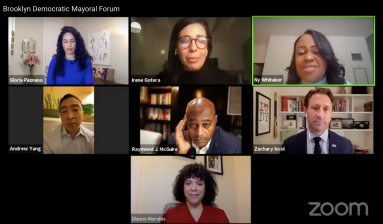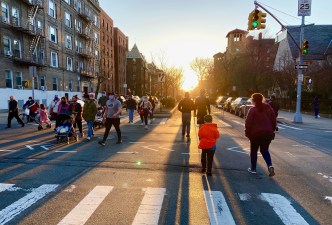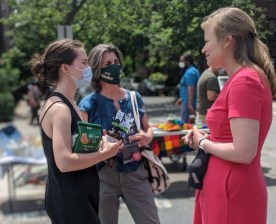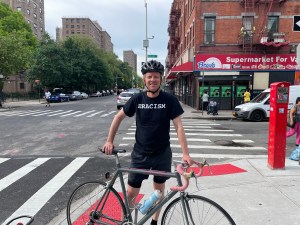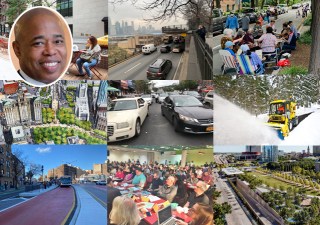THE COLON CYCLE: Kathryn Garcia Can See The Renderings
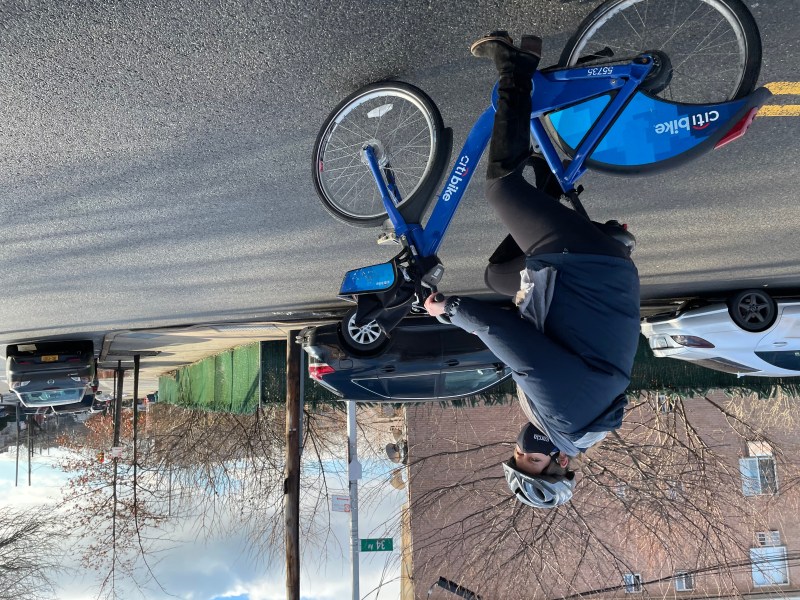
This is the third in a series of bike rides that ace reporter Dave Colon is having with mayoral candidates (prior chapters included a ride with Council Member Carlos Menchaca and a ride with Art Chang). Mayoral candidates interested in taking the “Dave Colon Challenge” should email dcolon@streetsblog.org.
“Can’t you see the rendering that I see?” asks mayoral hopeful Kathryn Garcia as she looks out at a busy block of storefronts on 82nd Street in Jackson Heights.
Currently, the block between 37th Avenue and Broadway is commercial stretch that looks like it could fit in a Long Island strip mall, with every inch of curbside given to parking, despite the fact that it borders a subway station and is has four bus lines running nearby. The former Sanitation commissioner previously said, “Renderings look great, but they don’t mean much if you can’t get it done,” but today she’s ready to share a vision.

“Can’t you see that you have more trees and a green barrier and bikes being able to be protected? That we have one side that’s building room for a possibility of pedestrian seating? I see it. Imagine if restaurants could be out there, if there was space for performance, where you could really bring the community together,” she said.
No more alphabet soup

“The comptroller has 30 days [to approve a contract]. On the 28th day, his staff sends questions, and restarts the clock all over again. There is a process, the money is there, but if we followed the process things would move more quickly. Contracting has to go through…one, two, three four, at least four or five agencies under mayoral control just to approve every contract. It’s changing the process and holding people accountable for what the process is supposed to be,” she said.
Garcia has the technocrat’s eye for using a machete to cut through red tape, and shies away from the hint of overpromising on anything, even if asked for a philosophical musing.
“You want an idea from me that’s totally insane?” she asks in response to a question seeking her most radical transportation idea. “I usually propose things that are ambitious but achievable, that’s sort of my MO. I don’t like the plan with no real plan. Headlines, hashtags. Are they actually going to really work?”
But wasn’t Garcia just saying that she looks at 82nd Street between 37th Avenue and Broadway and sees improvements that replace parking spaces with space for people? If so, changing the streets must be a common sense idea in a political world where common sense just isn’t very common anymore.
Just do it
“I think we have to completely reimagine the public realm, where we’re really sharing space so that you can safely be a cyclist or pedestrian. But also greening it, so that it’s more attractive to be in. Cleans the air, cools the street grid, and that helps with climate change,” Garcia said regarding her streetscape philosophy.
She gives a blunt answer when asked what it was that stopped the city from achieving that reimagining.
“Because we didn’t want to just get it done. People wanted their parking spaces. Isn’t it that simple?”
The things that are supposed to get done in the Garcia traffic and transportation plan include a litany of street repurposings that would require a Mayor Garcia to be the one who removes those parking spaces and car lanes. In addition to 250 miles of bike lanes, Garcia’s streets plan includes more busways, expanded open streets, pedestrian seating and a containerized garbage program that puts trash in the street. Garcia said she’s never been to a community board meeting with a bike lane as the main topic of the evening, but doesn’t sound cowed by the prospect of one.
“It’s a consulting process, it’s not a final say,” she said about community board involvement on bike lanes, for example. “You have to listen to communities, but you also can’t have a community opt-out where you don’t have connectivity. People ride through here, and this is for the whole city.”
If a community board screams bloody murder about a bike lane, Garcia said she’s open to hearing other ideas, but isn’t willing to have “no bike lane.”
“If your answer is really you have a different route, I’m more than open to hear what your different route is. But it can’t be nowhere,” she said.

But cynical politicos have found ways to slow things down with what they say are ignored alternatives, like when Mayor de Blasio ordered the DOT to look at Council Member Karen Koslowitz’s previously rejected idea for the last phase of the Queens Boulevard bike lane, effectively killing work on the last leg of the project in 2020.
And though Garcia sounded like she was ready to make space for pedestrians and cyclists on commercial strips like 82nd Street or 77th Street, she left the door open for parts of the city to describe themselves as hopelessly car-reliant.
“When I talk about the need to drive, there are people who live in places where there’s nothing walkable and nothing bikeable. When you’re out in south Brooklyn, eastern Queens, and the bus is designed to take you to work, it’s not designed to take you to get your nails done or go get groceries or see a hairstylist, go to the hardware store,” she said when asked about New Yorkers’ supposed “need” to drive.
Comments like that have found some pushback in the form of Bay Ridgeians who don’t believe their neighbors’ sob stories of needing a car or of that car needing every inch of street space in the neighborhood.
https://twitter.com/BayRidgeDrivers/status/1366540748229853186
Garcia doesn’t have a record to judge whether statements like that would mean that despite her promises of a fully connected bike network, some neighborhoods would sneak out of the picture. But she said, “it can’t be all or nothing” when the DOT goes somewhere like south Brooklyn and eastern Queens, and she may have additional cover from shifting political winds that see ascendant leaders like Queens Borough President Donovan Richards pitch protected bike lanes to the entirety of the borough.
On the other hand, she pointed to her record of hammering compromise into disparate parties when she worked on commercial waste zone reform, a successful effort that got her kudos from the New York Times editorial board.
Trial and error
Garcia’s pitch as the one who knows how to work the levers of government doesn’t mean she’s not interested in experimentation, though. She’s interested in trying new things if she thinks it can get the job done.
“One of the other things about COVID is you know we have a community board, but we have to have the larger community feel they’re a part of it. We incorporated Zoom into it, we can incorporate Clubhouse into that, so there are as many conversations as possible about what we want to see in our public realm,” she said about getting outside the confines of a community board.
Closer to the issue at hand, Garcia was also full of effusive praise for the 34th Avenue open street.
“I feel like this has been lovely, and people have really taken advantage of it. It’s a great example of, ‘We did it, the world didn’t come to an end.’ Kids were walking, their parents were walking. Someone was on Rollerblades, even though I think that’s a little dangerous. Someone was skateboarding. It felt very much like community. Did it work everywhere? No. But it worked here. So taking some chances with how we use our public realm is worth it.”
And the candidate described as “the city’s go-to crisis manager” for the roles she took on outside of her DSNY duties also said that the city should have been more open to trial and error when it got, let’s call it, constructive criticism, for giving bikes to the staff of Elmhurst Hospital but neglecting to add any protected bike lanes near the hospital.

“As long as you’re not blocking an ambulance, you should be able to make a quick safe change,” she said as she rode on the painted Broadway bike lane. “I’m sure they were really focused on the illness and not the next step ahead. But if you give [the staff] bikes, how are they going to get around? In a pandemic, you might not see everything, but when someone points it out, you have to be open to do something.”
She suggested bringing that same openness to building a better bike lane and introducing the world to a New York City innovation the same way we debuted the world’s first parking-protected bike lane in 2007.
“We should keep doing what we’re doing, we can’t slow down and wait for anybody. But we have so many talented people, so we can be engaging with all different sectors to get the best product,” she said.
In a campaign season where the major candidates are all participating in Bike New York or Transportation Alternatives forums, rolling out their slick single speeds for cameo appearances, it’s also refreshing to learn that even a contender who’s never been hit by a car driver or had a friend hit by a car driver won’t bullshit you about her actual bike bonafides.
“What? No, I do some park laps, or ride down Ocean Parkway, that’s what I do,” she said when asked if she’d ever done a bike ride from her Park Slope home to Yankee Stadium (Garcia is a Yankees fan and was therefore not asked about whether she had ever Biked to the Mets).
But she keeps an ear to the ground thanks to her son, a cyclist whose most frequent complaints to her are about the terrible upkeep of city streets that give him flat tires. And she seems to understands the design elements the city needs to bring to its bike infrastructure if more people are going to embrace the option.
“You have to presume when you’re doing something like this that you don’t have an experienced biker,” she said as she was shown a BIKE ROUTE sign at the chaotic intersection of Broadway and Roosevelt Avenue underneath the 7 train tracks. “You need to think about it from the point of view of the least-experienced rider and make sure they can manage the route.”
So Kathryn Garcia will show you renderings when she’s mayor, but won’t ask you to look at them for long.
“Going slow is not an option, you’ve got to go fast. We need to see the future and execute on the future,” she said.
